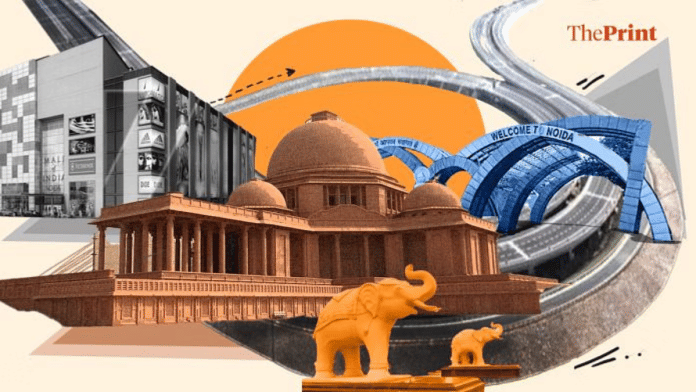New Delhi: The Supreme Court Wednesday ordered the registration of preliminary enquiries into alleged collusion between NOIDA officials and “farmers” who allegedly received inflated compensation for their land, in a far-reaching order that could reveal a possible quid pro quo between officials and landowners.
A bench of Justices Surya Kant and Joymalya Bagchi directed the Uttar Pradesh director general of police to constitute a new Special Investigation Team (SIT) and tasked it to conduct a thorough probe into the functioning of New Okhla Industrial Development Authority (NOIDA).
This SIT will replace an earlier investigation team set up in January to ascertain whether inflated payments were actually made to landowners as was alleged in an FIR. However, the new SIT will not look into instances where compensation to farmers was enhanced following court directions.
The issue of alleged overpayment to landowners came to the top court’s notice when it was dealing with an anticipatory bail petition filed by two NOIDA law officers in a corruption case in 2023. The Wednesday order was passed subsequent to the court perusing the earlier SIT’s report that flagged shortcomings in the functioning of NOIDA.
Upon its perusal, the bench passed another significant direction, restraining the NOIDA from approving any fresh project in the area without prior Environmental Impact Assessment and approval of the top court’s green bench that monitors developmental projects in eco-fragile zones.
According to the court order, the DGP shall constitute an SIT comprising three IPS officers to investigate the issues as identified by the previous SIT. This team will be headed by an officer not below the rank of Commissioner of Police, the order specifically said.
The new probe team was directed to register preliminary enquiries forthwith and proceed to inquire into the points highlighted by the previous SIT. It would be assisted by forensic experts as well as the Economic Offenses Wing of state police.
If after the preliminary enquiry, the new SIT finds commission of a cognisable offence, it shall register the case and take action in accordance with law. The SIT head will place the outcome of its probe before the court by way of a status report, which will be considered after eight weeks.
Wherever the SIT is required to seek prior sanction to prosecute officers (before registration of FIR under the Prevention of Corruption Act), competent authority shall accord sanction within two weeks of submission of application, ordered the court.
The previous SIT’s report, contents of which were highlighted by the bench during the hearing, confirmed 20 cases where landowners were allegedly paid exorbitant compensation. While the court had ordered revision of compensation in 1,167 cases, the NOIDA distributed enhanced compensation in lieu of land acquisition in 1,198 cases.
To confirm the allegations of collusion between NOIDA officials and the alleged beneficiaries, the SIT claimed that it would be necessary to examine bank account details of officers, their family members, landowners and assets acquired by the officers over 10 years ago. Official documents of that time would need to be scrutinised in detail, the SIT report stated.
The report also commented on NOIDA’s overall functioning, suggesting reforms in its structure. As it appreciated the authority’s current initiative, the SIT pointed out that NOIDA’s approach in cases is often reactive, instead of pro-active.
With a centralised governance structure, the NOIDA is unable to provide timely resolution to complaints lodged by residents, the report said, adding important decisions are made without adequate public scrutiny or inputs because a small group of individuals in the authority are part of the decision-making process that is non-transparent, with no public participation.
While recommending an overhaul of the NOIDA and its replacement with a metropolitan corporation, the SIT claimed the land allotment policies of the authority tend to favour developers.
The previous SIT suggested introduction of radical measures to infuse transparency in NOIDA’s functioning. This includes appointment of a chief vigilance officer, constitution of a committee monitored by the high court to codify the distinct powers of the NOIDA, regular third-party audits to ensure probity in financial transactions, regular scheduling of public meetings and a citizen advisory board and prioritised environmental impact assessments.
Taking note of the previous SIT’s observations on the NOIDA, the court directed the report be placed before the Uttar Pradesh chief secretary, who in turn shall place it before the council of ministers to take appropriate decisions.
It further ordered the chief secretary to post a chief vigilance officer in the NOIDA, who should either be an IPS officer or on deputation from the Comptroller and Auditor General. The bench gave the chief secretary four weeks to form a citizen advisory board.
(Edited by Ajeet Tiwari)
Also Read: The idea of Noida. The bad boy of NCR, Mall of India swag, a culture vacuum






